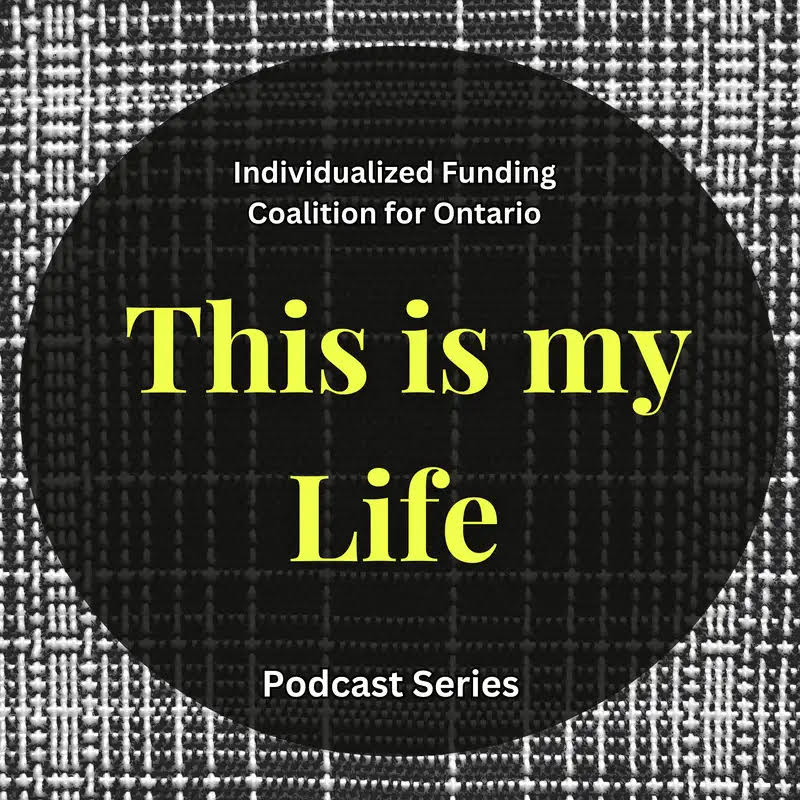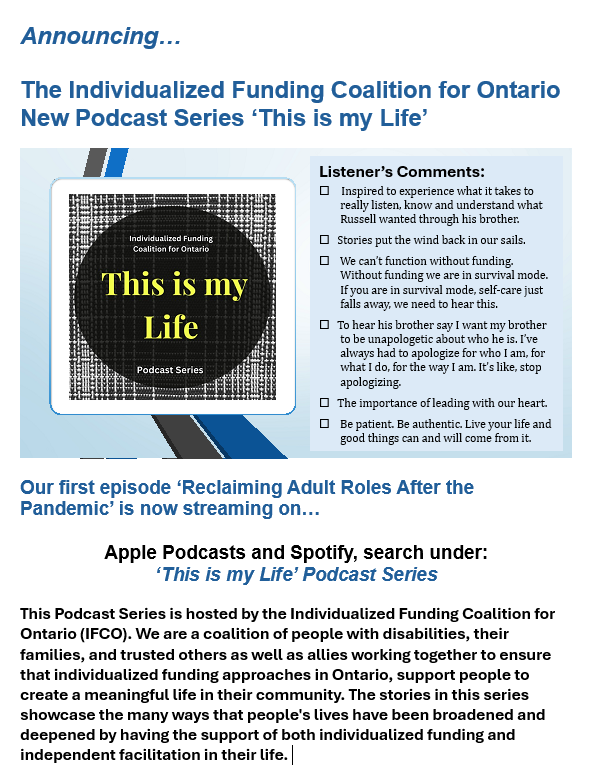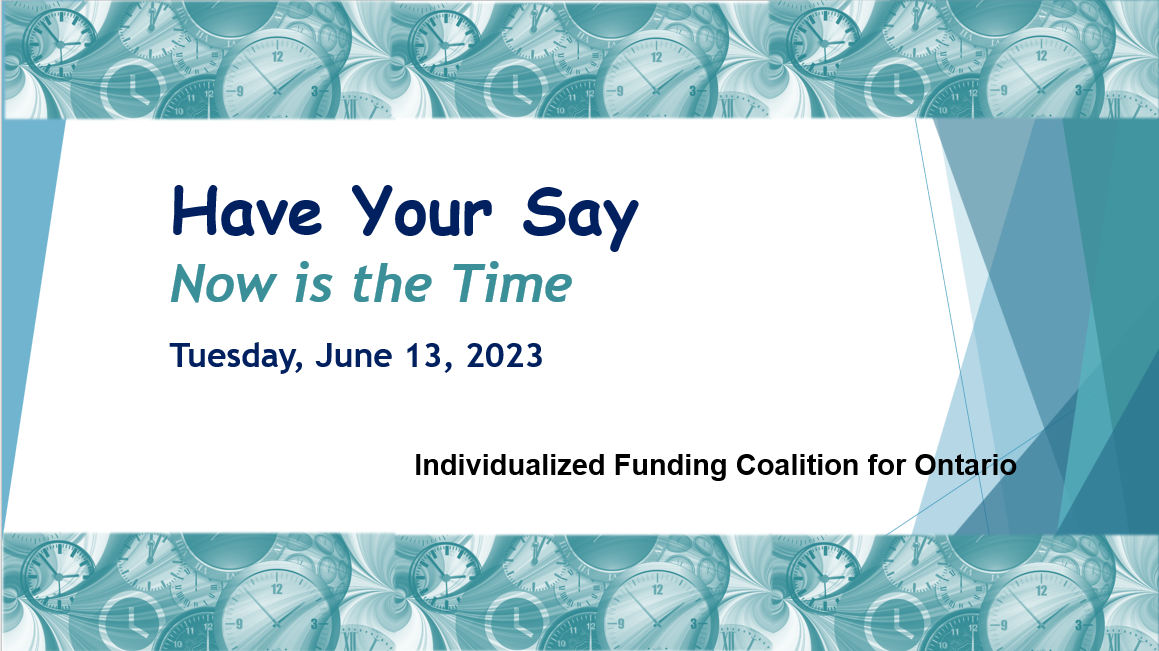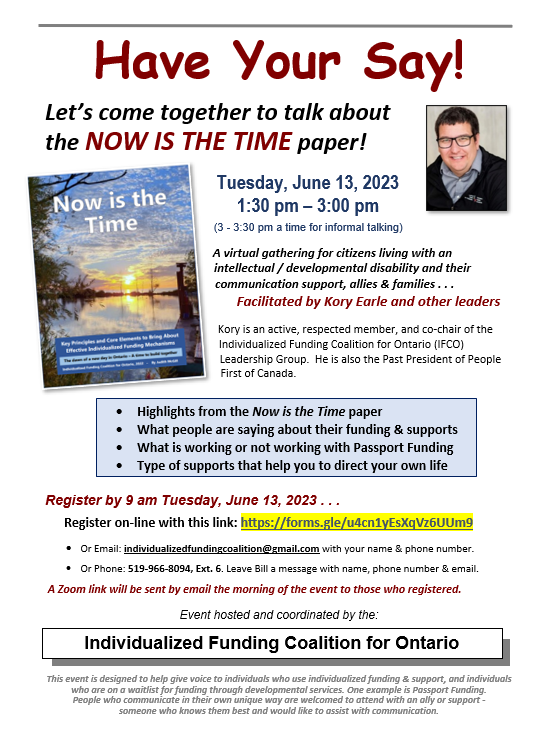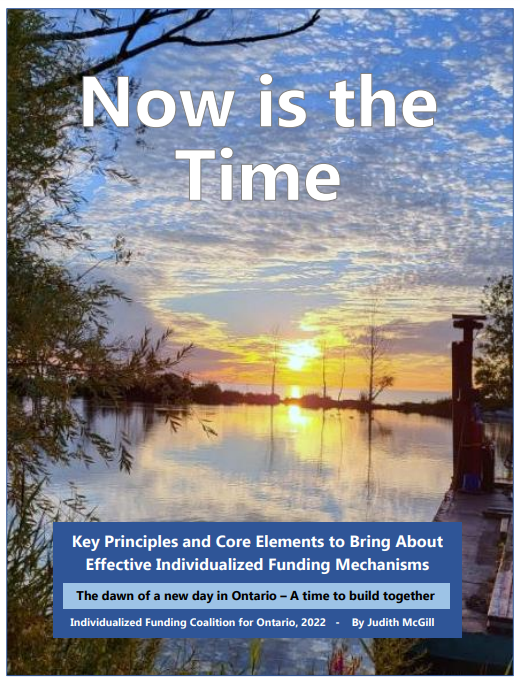WELCOME to the Individualized Funding Coalition for Ontario (IFCO) website!
Scroll down the Home Page to see IFCO activities and publications of the last two years! Lots to check out:
- Now is the Time paper and related powerpoints, events and conversations – starting Oct. 2022
- Enhancing Choices, Relationships, Citizenship and Inclusion with Individualized Funding, a comprehensive Powerpoint presentation containing important historical references – first prepared for the Community Living Ontario conference, September 2023
- News Briefs and Updates (2022-2024)
- Launch of ‘This is My Life’ Podcast Series in April with Episode 1 – Reclaiming Adult Roles After the Pandemic (April 2024) ; Launch of Episode 2 – Gaining New Perspectives (November 2024)
- Individualized Funding in Ontario, Pathways and Possibilities-Three Approaches to Work for All paper development – partnering with the Resources and Capabilities Committee, 2022-2024, Final paper launched October 2024
November 15, 2024 – An Announcement!
Gaining New Perspectives
Our second podcast in the ‘This is My Life’ Podcast Series has officially been launched!
To listen to Episode Two . . . use this link: Gaining New Perspectives
What you will hear? David’s mother Jennifer speaks candidly about how being accompanied by an independent facilitator and having individualized funding has contributed towards everyone in the family ‘Gaining New Perspectives’ on what it means to build a meaningful life and discover what it takes to work, day by day on making it happen.
What is the ‘This is my Life’ Podcast Series? This Podcast Series is hosted by the Individualized Funding Coalition for Ontario (IFCO). We are a coalition of people with disabilities, their families and trusted others as well as allies working together to ensure that individualized funding approaches in Ontario, support people to create a meaningful life in their community. The stories in this series showcase the many ways that people’s lives have been broadened and deepened by having the support of both individualized funding and independent facilitation in their life.
To listen to Episode One . . . . use this link: Reclaiming Adult Roles After the Pandemic
November 2024
Friendly Reminder – Inspiring Virtual Event!
Join us Wednesday, November 13, 2024 from 6:30 – 8:30 PM for Gaining New Perspectives! Our Newest Podcast!
Registration is still open! We have extended it until Monday, November 11, 2024 until 5 PM
REGISTER ON-LINE at this link: https://forms.gle/7dZvE3uDBzARqNyW6
This virtual event gives participants from across Ontario the opportunity to hear our NEWEST podcast! Come join us as David’s mother, Jennifer, speaks candidly during the ‘This is My Life’ podcast – our second in the series. Jennifer shares how having individualized funding and being accompanied by an independent facilitator has contributed toward everyone in their family “gaining new perspectives”. She shares what it means to build a meaningful life and discover what it takes to work, day by day, on making it happen.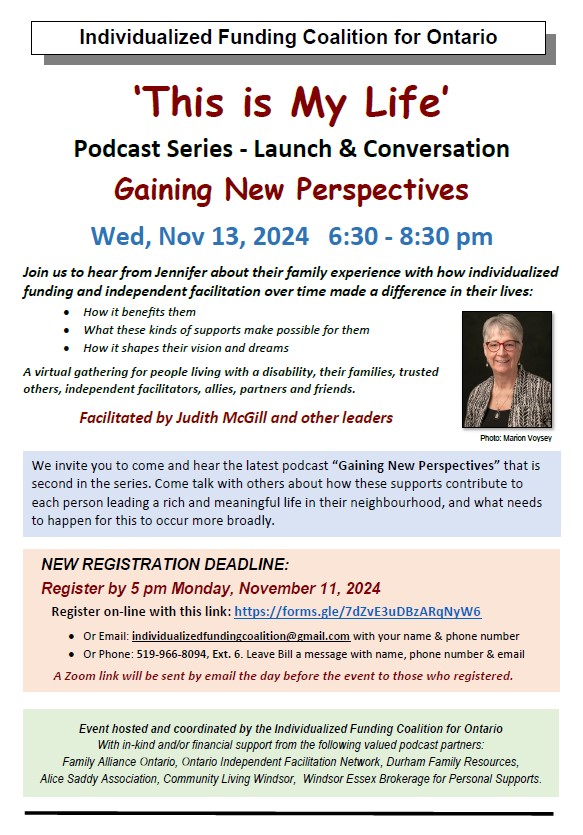
After listening to Jennifer’s story, participants will be welcome to share thoughts with others in a small break-out room. In coming back to the larger group, we will explore what is needed to get the relevant supports for people to live the life they imagine. Following the formal event, there will be an optional conversation for people and families from 8:30 – 9:00 pm.
This event is being facilitated by Judith McGill, along with others who are supporting the break-out groups! Thank you to all those volunteering to make this evening a success, and to all who have already registered! We are looking forward to being together virtually!
Updated Flyer-Nov.13,2024-Gaining New Perspectives
October 2024
Final paper is here!
Individualized Funding in Ontario, Pathways and Possibilities-Three Approaches to Work for All
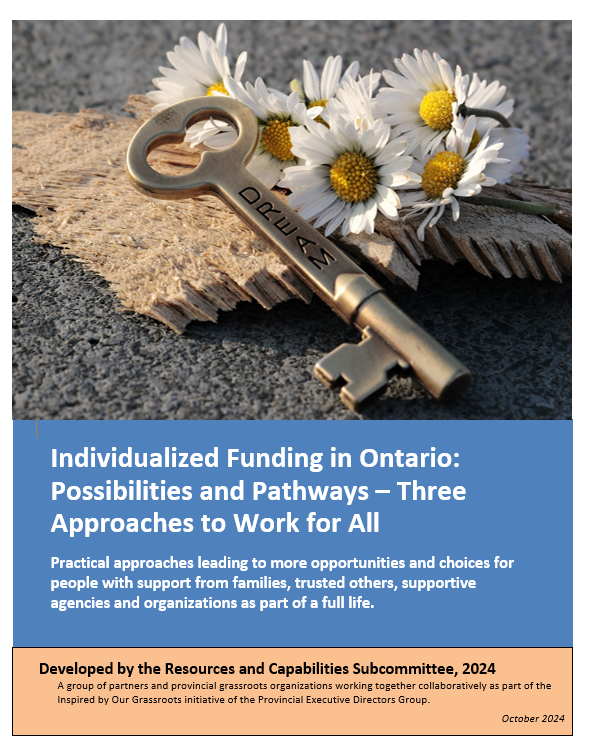 Leaders with the Individualized Funding Coalition for Ontario (IFCO) invite you to read the final publication by the Resources and Capabilities Subcommittee – Individualized Funding in Ontario, Pathways and Possibilities. The subcommittee made up of a broad-based group of individuals, partners and provincial grassroots organizations worked together for more than 2 years as part of the Inspired by Our Grassroots initiative of the Provincial Executive Directors Group in Ontario.
Leaders with the Individualized Funding Coalition for Ontario (IFCO) invite you to read the final publication by the Resources and Capabilities Subcommittee – Individualized Funding in Ontario, Pathways and Possibilities. The subcommittee made up of a broad-based group of individuals, partners and provincial grassroots organizations worked together for more than 2 years as part of the Inspired by Our Grassroots initiative of the Provincial Executive Directors Group in Ontario.
IFCO leaders, along with others, have been volunteering their time, talent and experience: developing this paper, preparing presentations, listening to feedback, and sharing at events. Much of the work on the paper has been rooted in the same values and principles found in the Now is the Time paper published by IFCO in November 2022.
You can also download a copy of the paper by clicking on the image above and/or using this link: Individualized Funding in Ontario, Pathways and Possibilities, Oct 2024, FINAL
October 2024
‘This is My Life’
Podcast Series Launch & Conversation – Episode 2
Gaining New Perspectives
Wednesday, Nov 13, 2024 – 6:30-8:30 pm
A virtual gathering for people living with a disability, their families, trusted others, independent facilitators, allies, partners and friends. Facilitated by Judith McGill, and other leaders.
REGISTER ON-LINE at this link: https://forms.gle/7dZvE3uDBzARqNyW6
- Or Email: individualizedfundingcoalition@gmail.com with your name & phone number.
- Or Phone: 519-966-8094, Ext. 6. Leave Bill a message with name, phone number & email
Register by noon Sunday, November 10, 2024 (registration extended)
Join us to hear from people and families about their experience with how individualized funding and independent facilitation over time makes a difference in their lives:
- How it benefits them
- What these kind of supports make possible
- How it shapes their vision and dreams
We invite you to come and hear the latest podcast “Gaining New Perspectives” that is second in the series. Come talk with others about how these supports contribute to each person leading a rich and meaningful life in their neighbourhood, and what needs to happen for this to occur more broadly.
There will be an optional chat for people and families following the event from 8:30 – 9:00 pm.
Summer, 2024
How to Become an IFCO Member!
Would you like to be a part of the movement and join this important work? You can become a member by . . .
- Using this on-link: https://clw.formstack.com/forms/ifco_membership
- OR by mailing us the IFCO Information and Membership Brochure, 2024
- Learn more about what it means to be a member
May 6, 2024
Announcement: Our New Podcast Series!
To listen to Episode 1, ‘Reclaiming Adult Roles After the Pandemic’, on your favourite streaming platform, cut and paste the following into your search engine: ‘This is my Life’ Podcast Series
For another option to listen to the podcast use the following link: “This is My Life’ Podcast Series”
To download the announcement flyer for sharing with others, click here: Announcing IFCO New Podcast Series Episode One-Reclaiming Adult Roles After the Pandemic
April 2024
New! Read all about it!
Leaders with the Individualized Funding Coalition for Ontario (IFCO) invite you to read a new publication called: Individualized Funding in Ontario, Possibilities and Pathways – Three Approaches to Work for All, Practical approaches leading to more opportunities and choices for people with support from families, trusted others, supportive agencies, and organizations as part of a full life.
IFCO leaders have been volunteering their time in the development of this publication as members of the Resources and Capabilities Subcommittee – group of partners and provincial grassroots organizations working together as part of the Inspired by Our Grassroots initiative of the Provincial Executive Directors Group. Check out the results of this collaboration of partners – people, families, independent facilitators, agencies and provincial grassroots organizations. Feedback is welcome! Have a read of the April 2024 draft. (Note draft version has been removed. Final version posted above.)
April 2024
IFCO News Brief April 2024 – What’s Inside
 We invite you to look at our April 2024 News Brief to get caught up on our project work, read about our 2024 Membership Drive, and much more. Topics within the news brief:
We invite you to look at our April 2024 News Brief to get caught up on our project work, read about our 2024 Membership Drive, and much more. Topics within the news brief:
- ‘This is My Story’ Podcast Series
- ‘From My Heart to Yours’, Story Sharing Initiative in 2023
- IFCO Membership Drive, 2024
- Other News: Upcoming Presentations and Outreach
- Things to do: Stay tuned to the home page of our website and RDSP advocacy made easier, see what Family Alliance Ontario has prepared . . .
- Thank You AND RDSP pages by Family Alliance Ontario
- Picture here and in news brief are from Pixabay
Some sample news: In our February 2024 News Brief, we introduced friends of the Individualized Funding Coalition for Ontario to our podcast series/stories project, with a promise of more information to follow. This project first got underway with its foundational and development phase in November thanks to a Family Engagement Grant from Community Living Ontario. Since that time additional funding was sought and secured through partners/agencies who believe in this work and the power of stories.
Many thanks to IFCO leaders who sought out support for the podcast series, and to the following for providing funds for the next phases of the project: Alice Saddy Association, Community Living Windsor, Durham Association for Family Resources & Supports (Durham Family Resources) and Windsor-Essex Brokerage for Personal Supports.
This additional funding enabled our project coordinator, Judith McGill, and volunteer leaders, including independent facilitators, to continue working on the second and third phases of this project. And to begin some conversations in order to move things toward a fourth phase of the project with focus on a Northern Ontario component.
To read the news brief, click here: IFCO News Brief, April 2024, with RDSP Advocacy
Individualized Funding Coalition for Ontario sends . . . . . . . A BIG THANK YOU!
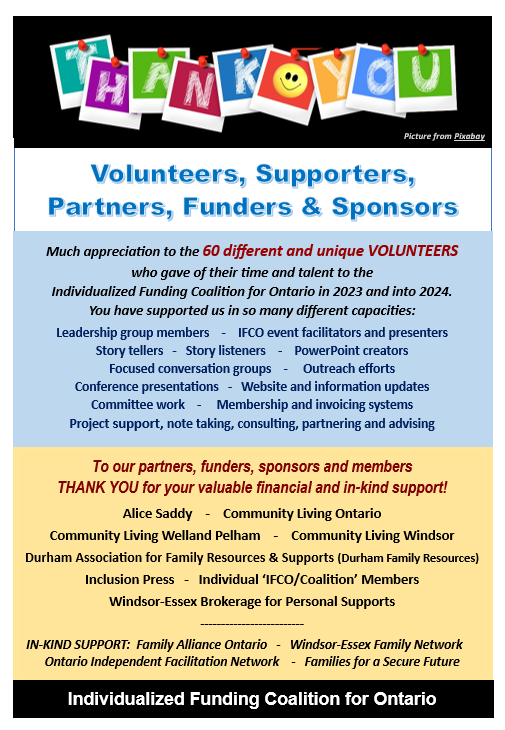
March 2024
‘This is My Life’ ….. Stories Podcast Series Launch & Conversations
Tuesday, April 16, 2024 – 6:30-8:30 pm
A virtual gathering for people living with a disability, their families, trusted others, independent facilitators, allies, partners and friends. Facilitated by Judith McGill, Kory Earle and other leaders. 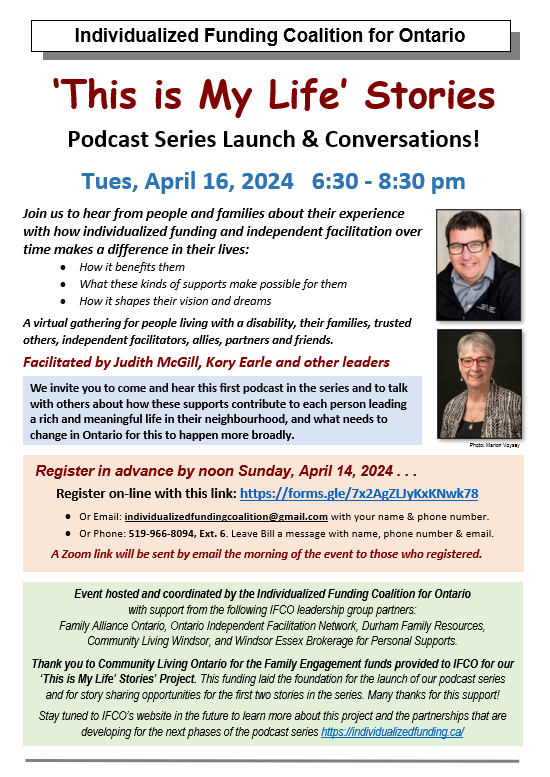
REGISTER ON-LINE at this link: https://forms.gle/7x2AgZLJyKxKNwk78
- Or Email: individualizedfundingcoalition@gmail.com with your name & phone number.
- Or Phone: 519-966-8094, Ext. 6. Leave Bill a message with name, phone number & email
Register by noon Sunday, April 14, 2024
Join us to hear from people and families about their experience with how individualized funding and independent facilitation over time makes a difference in their lives:
- How it benefits them
- What these kind of supports make possible
- How it shapes their vision and dreams
We invite you to come and hear this first podcast in the series and to talk with others about how these supports contribute to each person leading a rich and meaningful life in their neighbourhood, and what needs to change in Ontario for this to happen more broadly.
You can download the flyer by clicking on the picture above or using the link here: IFCO ‘This is My Life’ Stories Launch and Convos Flyer, April 16, 2024
There will be an optional chat for people and families following the event from 8:30 – 9:00 pm
February 2024
Hello Friends of IFCO – A News Brief
It has been a long time since you have heard from the Individualized Funding Coalition for Ontario (IFCO). With funding very limited and some of our volunteer leaders facing some health issues and personal pushes and pulls, IFCO has needed to take a step back as we attempted to secure some funds. We look forward to being in contact more often again going forward!
We are opening up this ‘news brief’ wanting to remember and honour a dear friend of the Individualized Funding Coalition for Ontario and a mentor to many of us, Andrew Bloomfield.
Remembering Andrew Bloomfield
Andrew passed away unexpectedly in January. His passing saddened many. Andrew’s life’s work, his stories, and his life inspired and touched huge numbers of people and families in Ontario and far beyond.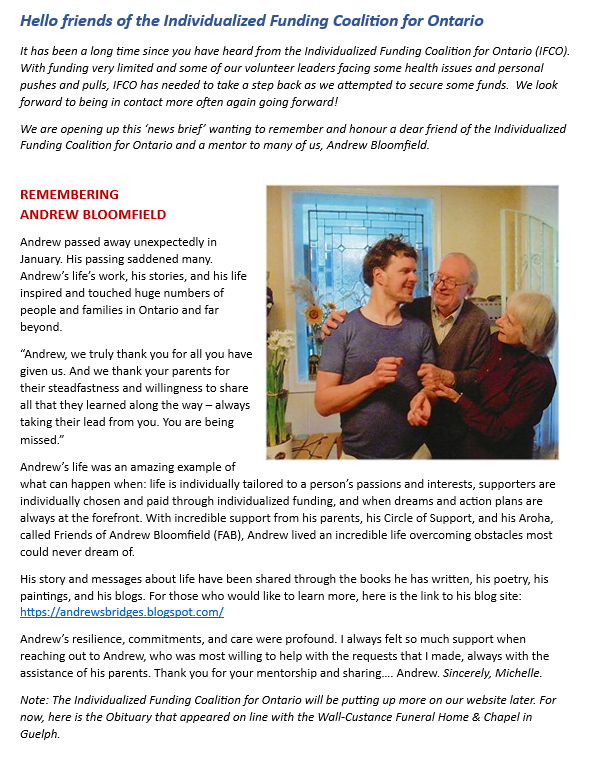
“Andrew, we truly thank you for all you have given us. And we thank your parents for their steadfastness and willingness to share all that they learned along the way – always taking their lead from you. You are being missed.”
Andrew’s life was an amazing example of what can happen when: life is individually tailored to a person’s passions and interests, supporters are individually chosen and paid through individualized funding, and when dreams and action plans are always at the forefront. With incredible support from his parents, his Circle of Support, and his Aroha, called Friends of Andrew Bloomfield (FAB), Andrew lived an incredible life overcoming obstacles most could never dream of.
His story and messages about life have been shared through the books he has written, his poetry, his paintings, and his blogs. For those who would like to learn more, here is the link to his blog site: https://andrewsbridges.blogspot.com/
Andrew’s resilience, commitments, and care were profound. I always felt so much support when reaching out to Andrew, who was most willing to help with the requests that I made, always with the assistance of his parents. Thank you for your mentorship and sharing…. Andrew. Sincerely, Michelle.
Note: The Individualized Funding Coalition for Ontario will be putting up more on our website later. To see the Obituary that appeared on line with the Wall-Custance Funeral Home & Chapel in Guelph click on the picture or the link below to see the entire News Brief.
Other Snippets from the February News Brief follow . . . .
Proposal Development: After receiving clear direction from people and families during a vibrant conversation following our virtual gathering in June, IFCO put together 2 proposals for small amounts of funding over the summer.
It was our goal for IFCO to be able to develop stories with people and families who have had experience with larger amounts of individualized funding and independent facilitation so that others could learn about their successes and participation as citizens, AND for IFCO to continue the momentum by holding community engagement events. One proposal was turned down. A portion of the second IFCO request was funded for some story development. The This is My Life Stories project got underway in November thanks to the Family Engagement funding from Community Living Ontario. Look for more on this later.
Summer/Fall 2024: Despite IFCO having to put a pause on our community engagement gatherings like Coffee & Conversations, Have Our Say, and Now is the Time, due to our limited resources there has been other action behind the scenes – a result of the commitment, time and talent of volunteers. Check out the news brief to learn more.
This is My Life Stories Project: With the funding received for the development of stories, IFCO was able to secure a project coordinator. Judith McGill, has been able to lay the foundational work for launching a first podcast containing 2 stories at an IFCO event on April 16, 2024 in the evening. Two families/ individuals have been interviewed for the podcast series. Their stories will demonstrate to others what life can be like with the support of individualized funding and independent facilitation. There will be opportunity for dialogue and sharing at this event. Stay tuned for more information.
To see the entire News Brief click here: Hello Friends of IFCO – News Brief Feb 23, 2024
September 2023
Individualized Funding Coalition for Ontario and Collaborators – Presentation made at Community Living Ontario’s Provincial Conference September 28, 2023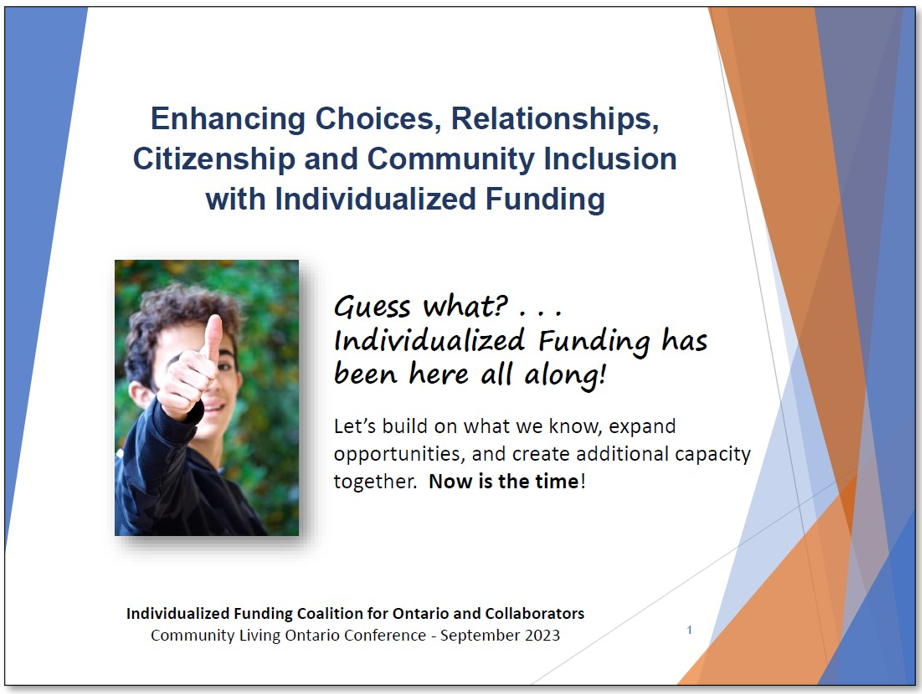
Many thanks to the following IFCO leaders and collaborative partners who came together and did a great job on this presentation representing what people and families have shared, as well as stakeholders and partners involved with the Coalition: Kory Earle, Betty Daley, Colleen Mitchell, Melodie Cook and Shawn Pegg. This PowerPoint presentation helps the audience take a look at our rich past in Ontario. It encourages participants and readers to build on what we know in Ontario, expand opportunities and create additional capacity together. Now is the time to reach out to those with experience and knowledge in our own Province! To see the presentation and bonus slides that are included click on the image above or use this link: IFCO PPT CLO Conference Sept. 2023
July 2023
Follow-up from the Have Your Say Event held June 13, 2023 – PowerPoint Presentation and more
Many thanks to family leaders Michelle Friesen and Betty Daley for stepping in last minute to facilitate this gathering. Much appreciation also goes out to the participants of this event who shared openly and candidly about their experiences and their hopes for the future. Many thanks for the affirmations about the messaging in the Now is the Time paper. Quotes included: “This is exactly what we have been saying all along.” “What more can be done to help make this happen?” It is important to note that the direction received from the people and families who attended this event greatly influenced the planning and proposal writing that followed. To see the PowerPoint click on the picture and or follow this link: Have Your Say, PPT June 13, 2023 FINAL
May 2023
Have Your Say! Let’s come together to talk about the NOW IS THE TIME paper!
Tuesday, June 13, 2023 – 1:30-3:00 pm
(3:00-3:30 pm optional chat)
A virtual gathering for citizens living with a developmental / intellectual disability and their communication support, allies & families . . . Facilitated by Kory Earle and other leaders.
REGISTER ON-LINE at this link: https://forms.gle/u4cn1yEsXqVz6UUm9
Or Email: individualizedfundingcoalition@gmail.com with your name & phone number.
Or Phone: 519-966-8094, Ext. 6. Leave Bill a message with name, phone number & email
Register by 9 am Tuesday, June 13, 2023
You can download the flyer here: Have Your Say, FLYER, June 13, 2023-FINAL
April 2023
“From My Heart to Yours”, Story Sharing Evening
Monday, May 1, 2023 – 6:30-8:30 pm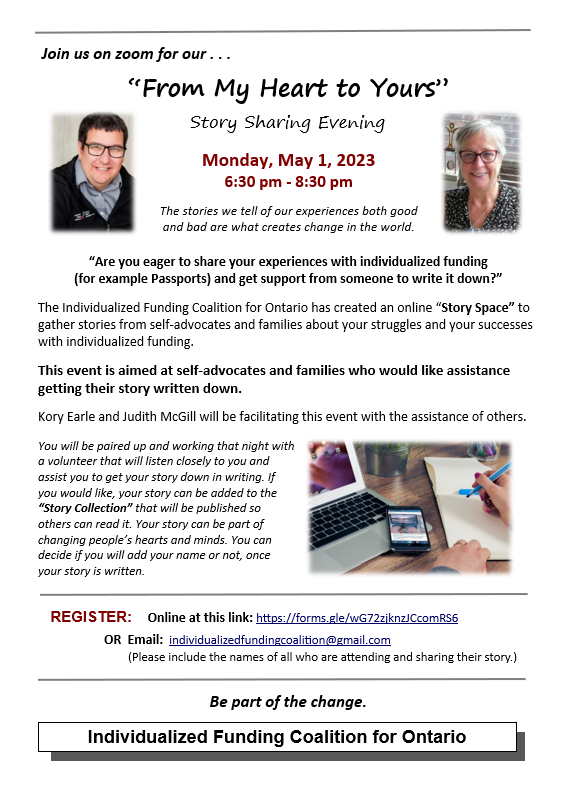
Would you like assistance getting your story written down? If so, join us on May 1, 2023 at 6:30 pm to receive assistance. People and families who would like help to get their story written down, will be matched with a volunteer who will assist.
Register online here: https://forms.gle/wG72zjknzJCcomRS6
OR by emailing: individualizedfundingcoalition@gmail.com
Here is the flyer with more details: From My Heart to Yours, Story Sharing Event – May 1, 2023
——- Are you someone who would like to assist a person to share their story and get it written down? If so, please email the Individualized Funding Coalition at the email above. Let us know of your interest. Judith and Kory will connect soon.——–
March 2023
Out the Starting Gate with Actions, Learning and Hope!
A total of 73 participants came together virtually for the Now is the Time gathering on March 23, 2023! Participants attended from all across the province as far north and west as Kenora and as far south as Windsor and Essex County. A total of 52 people and families attended, as well as 21 agency professionals and independent facilitators. Twelve family-led networks and organizations were represented. Eight independent facilitation organizations and/or facilitation training orgs were represented, as well as seven supportive agencies. As a result of polling results from three surveys during the event AND conversations with self-advocates, families and allies, leaders with the Individualized Funding Coalition for Ontario have a wealth of information for further direction. 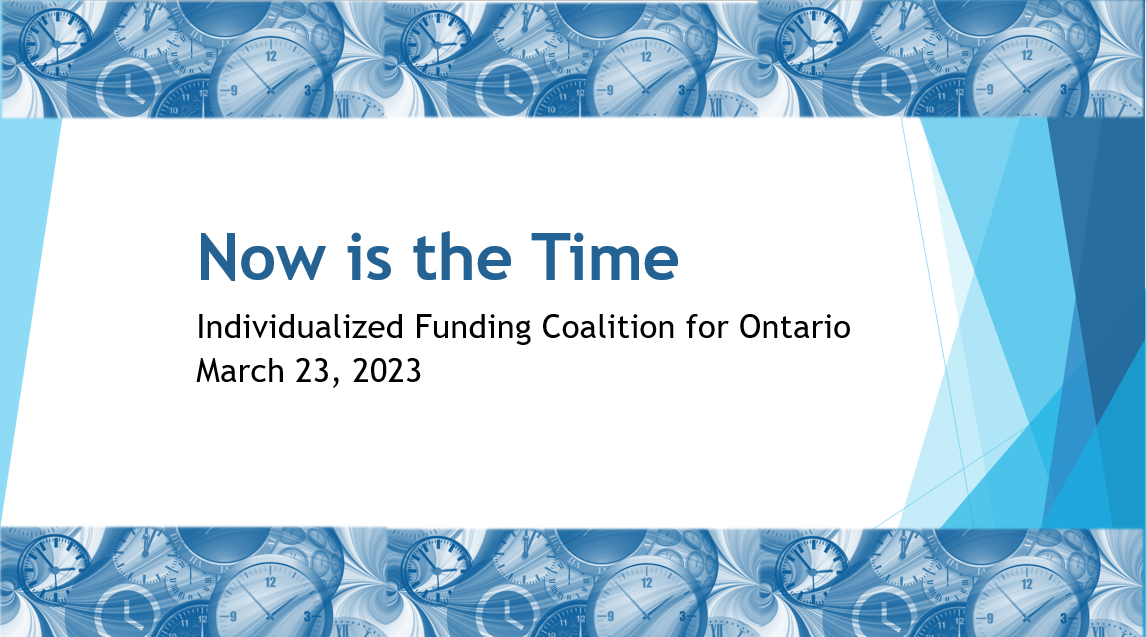
The PowerPoint Presentation is available. The last slide in the presentation has a number of links on it to direct people to various types of information. This could be helpful if you decide to have conversations in your own communities, and/or want to be part of some actions. Click below to download a pdf of the PowerPoint: PPT Now is the Time Mar 23, 2023 Event.
Highlights that have come about because of the gathering and/or with follow-up include:
- Story Sharing Evening planned for Monday, May 1, 2023 6:30 – 8:30 pm
- Volunteers coming forward to assist others with their stories and get them written down
- Plans for supporting story writers/listeners
- Local conversations that are starting to be talked about
- Invitations for new partnership ventures with IFCO
- New action pages added to the IFCO website
- Link for on-line membership form: https://clw.formstack.com/forms/ifco_membership
- New Information and Membership Brochure for download on the website.
February 2023
An invitation for conversation and collective action! Welcome fellow citizens: individuals, families, friends, partners and allies! Join this event – a call for action, learning and hope!
Now is the Time! Thurs. March 23, 2023 – 6:30-8:00 pm
Have you experienced barriers that prevent you or someone you care about from living life as a full citizen? Have you or someone you care about who lives with disabilities, been waiting a long time for SSAH, Passport, or any other type of individualized funding in this province? Do you need adequate funding to pay support workers to help live a basic life like other citizens in Ontario? Do you wish you had a facilitator – someone that stands with “you” through life’s ups & downs? IF YOU ANSWERED YES TO ANY OF THESE QUESTIONS – THIS EVENT IS FOR YOU! HERE IS WHAT TO EXPECT:
- A starting point for all of us!
- Highlights from the Now is the Time paper!
- A common message!
- Actions that are doable! Sharing of ideas!
- Partners & allies who are aligned and want fellow citizens – people and families living with disabilities – to do more than ‘just’ survive . . . and to have the right supports and funding for a self-directed tailor-made everyday life!
- 8:00-8:30 pm – An optional time for peer-to-peer conversations and questions.
DOWNLOAD THE EVENT FLYER HERE: Now is the Time! March 23, 2022-Flyer
October 2022 – Message from the Individualized Funding Coalition (IFCO)
Now is the Time!
The Individualized Funding Coalition for Ontario (IFCO) is pleased to be launching a comprehensive paper called: Now is the Time, Key Principles and Core Elements to Bring About Effective Individualized Funding Mechanisms in Ontario. Click the image or this link to download Now is the Time
This paper is a synthesis of many of the writings produced by IFCO, as well as some provincial, national and international research reports and information, and direct input from people, families and others. It is about individualized funding, third party assistance like independent facilitation and planning, individualized mechanisms and structures for people including the recognition of rights, support for decision-making, social networks and more. All this leading to an effective individualized approach for living an everyday, ordinary life of inclusion and social connections.
The principles, core elements and approaches described in this paper apply to all people living with vulnerabilities at every stage of life from young children and families looking for community inclusion, to youth and adults living their own unique lives, to elders and seniors who want to stay in their homes, neighbourhoods and communities.
IFCO has had opportunity to collaborate with many like-minded individuals, families, allies, agencies and provincial partners over the past 28 years while working to build positive change. The kind of change that leads to people and their trusted others having control over key decisions, and having the funding and supports they need to live a good life expanding relationships and meeting others.
The values and principles taken up by IFCO have been affirmed by individuals, their families and/or trusted others over time and proven to be central elements of a desirable individualized funding model. These principles include community inclusion, community first, natural relationships and access to third party structures, (like independent facilitation and planning supports), to foster an everyday, ordinary life of inclusion. They have been re-affirmed recently with input from people, families, and allies at 10 different gatherings where IFCO was presenting and/or facilitating discussions in 2021 and 2022. Affirmation also came through many international research reports that have been published in the last 4 years that identify shared values and principles, similar to those we have named as crucial to the success of individualized funding, also lending credibility to the work.
The primary purpose of the first individualized funding programs developed in Ontario was to promote social inclusion by supporting individuals to remain in their homes and to contribute in their neighbourhoods and local community. The focus on social inclusion and supporting individuals (of all ages) to live in their homes, neighbourhood and local community has been significantly lost over the past 10 years.
Today, we are seeing less investment for individualized, inclusive type/home support funding being allocated for individuals with physical disabilities, individuals living with developmental/intellectual disabilities, and older citizens who need extra assistance. We are finding that the individuals and families who were devoted in their advocacy for social inclusion and who worked at creating individualized custom supports feel defeated. Not only because they are aging and have less capacity to continue to advocate for coherent options, but because they see a bleak future for their loved one and even for themselves. One of our allies has summed it up best: “For people with disabilities needing support it is like having a straight line to Long-Term Care.”
We all know that Long Term Care institutions continue to be heavily funded to grow and expand as a ‘residential’ option. LTC institutions appear to be the acceptable default option for seniors and people with disabilities. We have seen LTC being promoted and favoured for those living with significant needs in social media. Without investments in individualized funding, supportive housing arrangements and daily life, the future looks grim.
At recent IFCO gatherings, we heard loud and clear that people and families were highly dissatisfied with the lack of adequate and equitable individualized funding, the unreliability of the funding, and the lack of power and control they were given over the funding. They were also frustrated with the lack of resources they were given to engage independent facilitation and planning support to enhance their capacity for creating an everyday ordinary life in the community.
The Now is the Time paper outlines individualized funding approaches that recognize basic rights with supports for decision-making, along with good principles, and adequate funding to live a good life – all together keystone pieces that make a significant difference moving forward. The paper presents a way to ground joint action in core values and principles.
The Individualized Funding Coalition for Ontario recognizes the need to bring like-minded individuals, families, trusted others, allies, independent facilitators, agencies and provincial partners together for collective action and moving forward. We leave off with an invitation forthcoming for collective action . . . Now is the Time.
Welcome
The Individualized Funding Coalition for Ontario (IFCO) would like to welcome you to our website. It is our hope that you will find this site helpful for learning more about Individualized Funding and the possibilities it presents for people living with disabilities and for our elders as they face changes in their later years. We are a ‘coalition’ of different members who have lived experience with disability and various forms of individualized funding. We are working together to keep moving Individualized Funding forward in Ontario.
Individualized Funding is a support that assists people with disabilities and others to live an everyday ordinary life because it offers more choice and control. Supporting people to make their own decisions also assists them to live an ordinary life. Below is the IFCO Accord which outlines more fully what we believe.
Our Accord
The Individualized Funding Coalition for Ontario supports the self-determination of persons with disabilities.
We believe in all people having control over decisions concerning where they live, with whom they live, with whom they associate and how they spend their lives.
In order to achieve this we recognize that Ontario must develop a system of funding whereby the person requiring assistance, supported as appropriate by family and/or others, has access to and control over the funds allocated for his/her supports.
Website Information
Thank you for visiting the website for the Individualized Funding Coalition for Ontario. The purpose for this site is to provide information to members and allies about individualized funding and related topics. Most of our own documents available for downloading on the site have been updated with our current email address. There may be a few that have the old information. Please note our current contact information below.
Contact information:
Address: Individualized Funding Coalition for Ontario
c/o 3357 Walker Rd, Suite 2, Windsor, ON N8W 5J7
Email: individualizedfundingcoalition@gmail.com
THANK YOU for your visit today!
If you would like to join this important work in Ontario and become part of this movement, we welcome you!
- Join IFCO by using this on-link: https://clw.formstack.com/forms/ifco_membership
- OR mail us the IFCO Information and Membership Brochure, 2024
- Learn more about what it means to be a member

